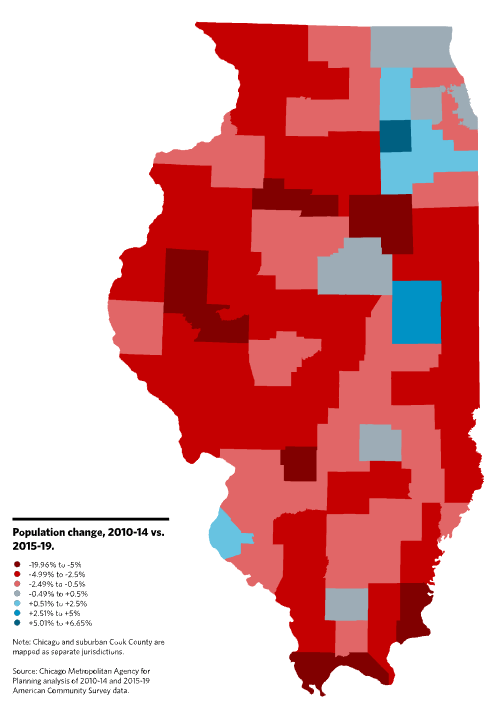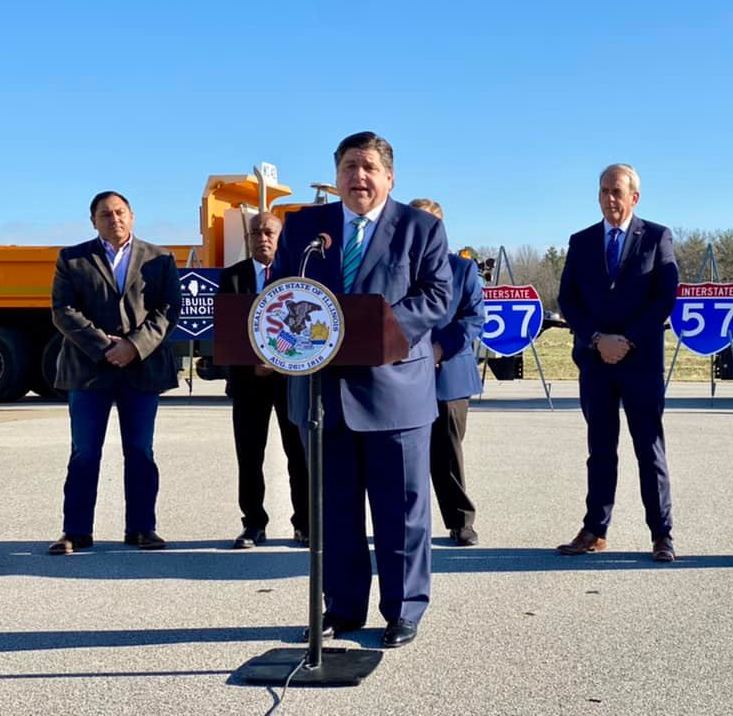Thanks to Streetsblog reader David Robinson for alerting us about this interview.
Illinois governor J.B. Pritzker generally has a decent record on transportation. Soon after taking office, he passed the nearly $45 billion Rebuild Illinois infrastructure funding bill, which included longterm, sustainable funding for public transportation, with transit receiving $4.7 billion over the first six years and $281 million for each year afterwards, as well as a $50 million annual bike/walk fund. The legislation also doubled the state gas tax and indexed it for inflation; and earmarked money for improving and expanding freight, passenger, and commuter rail.
Under Pritzker, Illinois banned the suspension of driver's licenses for non-moving violations (which Streetsblog Chicago endorsed); eliminated the 20 percent local match requirement for state funding of walk/bike infrastructure; and passed a bill allowing counties to use gas tax revenue for non-auto infrastructure. These are all good things
The main problem with Pritzker's transportation policies has been his support for highway expansion. That's politically popular with drivers who hope in vain that more lanes will mean less sitting in traffic jams. But it diverts billions of dollars from sustainable modes that would actually help address congestion problems, while increasing driving, crashes, and transportation inequities. And, as others have pointed out, this approach is also totally counterproductive to the governor's stated goal of fighting climate change.
Two tweets hours apart that show why electing Democrats is not enough to fight climate change. pic.twitter.com/lXvU67UHgE
— Naqiy Mcmullen (@NaqiyFL) December 9, 2021
The governor's enthusiasm for highway expansion increased after the passage of $1.2 trillion federal infrastructure bill, with Illinois is expected to get $17 billion. Sadly the state is planning to spend much of that money on expanding expressways and Interstates. $2.7 billion would be spent to reconstruct and widen the Eisenhower Expressway between Racine Avenue in Chicago and Wolf Road in west-suburban Hillside.
The Illinois Department of Transportation also plans to add two lanes to the Stevenson Expressway (I-55) from the Tri-State Tollway to downtown Chicago, and one lane each way from the Tri-State to I-355, which is projected to cost a billion dollars. The department also wants to add two lanes on I-55 through Springfield, I-57 further south, and I-270 in the Illinois portion of the St. Louis metropolitan region.
In a mid-December interview with the governor for Illinois Public Media on various state policy issues, host Brian Mackey did a good job of holding Pritzker accountable for the disconnect between the governor's stated climate goals and his highway expansion plans. Here's a transcript of that part of the interview, with some commentary by yours truly in italics.
Brian Mackey: Governor, I want to move on to climate change. You've talked a lot about Illinois leading the nation, making history with the new law on clean energy. According to the Federal Energy Information Agency, though, the power sector is no longer the biggest source of carbon dioxide emissions. The biggest culprit is now the transportation sector. And we had a conversation on this show a few weeks ago about Illinois widening Interstates in Chicagoland and elsewhere, spending a projected $217 million dollars to redo the interchange of I-57 and 74 near Champaign, among other projects. When will Illinois' transportation spending be brought in line with its commitment to reduce carbon emissions?
Great question. Note that Mackey didn't ask whether highway expansion is in line with the state's climate goals, but stated the obvious: It isn't.
J.B. Pritzker: Well remember that when we're fixing our roads, those roads can be used by electric vehicles. And indeed we've been focused on building our electric vehicle sector. Not only individuals' private cars, but also buses, trucks, and other vehicles that travel on the road, and not only are we encouraging that, and providing dollars, making those available, so that, for example, schools can make the conversion from diesel-powered buses to electric buses, we have a manufacturer Lion Electric right here in Illinois that just came here recently, but also, more broadly, y'know, we want to be a state that is host to electric vehicle manufacturers and suppliers. And indeed I was just on the phone with one in the last hour, encouraging them and showing them what incentives we provide.

Sure, electrification of buses, trucks, and whatever private cars truly need to be on the road, is a good thing. But even if we could magically convert all cars to electric right now, highway expansion and the resulting increase in driving would still contribute to societal problems: more traffic injuries and deaths, car dependency, suburban sprawl, land wasted on parking, and so on. And even electric cars have many environmental downsides.
So I know there are people who want to complain that we should put more dollars in some other bucket of transportation. But, look, our highways, our roads are important, so is transit, by the way, and we are putting billions of dollars into transit across the state. And when I say that, rail. Not only do we have an expansion of Amtrak that will go on here in the state, but we also are also helping to move freight that way, that is, on rail as opposed to diesel-powered trucks, for example.
So we're doing everything that we can to reduce our emissions in the state in every way possible. But y'know, there's always more that we should look at and do, but roads are not alone some sort of evil. It's really who's emitting what, on those roads. And again, we want to have a million electric vehicles on the road in Illinois by 2030.
Right, roads themselves aren't necessarily a problem. Repairing highways that need maintenance often makes sense, and can improve safety and fuel efficiency. Road expansion is the evil here.
Brian Mackey: I think they would say, and they have said on our show, it's not necessarily which bucket. They would love to see that money go into bike lanes and what they call active transportation: walking, bike lanes, and public transportation. But so much widening and more widening and more widening, you sort of induce demand and create sprawl, and that, you know, leads to people getting in their cars, and yes, maybe there'll be electric someday, but that electricity has to come from somewhere, as opposed to encouraging density and, and stopping the sprawl.
Nice follow-up by Mackey, noting that highway expansion means less money is available for green modes, and more lanes means more driving and sprawl. It's also good that he pointed out that, while electric cars can help reduce emissions in metro areas, generating the electricity usually creates pollution elsewhere.
J.B. Well, again my view is that we have 18,000 miles of highway in the state, people are going to be driving on them for some time to come. And we have every once in a while, a real opportunity to update our transportation infrastructure. And that obviously doesn't just include roads.
And I also think that people are looking for ways to get out of the city and to live in places where there aren't millions of people or hundreds of thousands of people. And we encourage that. We're creating broadband everywhere in the state, so that every small town and every county in the state can host businesses and homes. And people can have that kind of high speed connection, so they can build the economy that they want and also do it without having to be in a dense urban environment.

This appears to be a pretty dubious statement by Pritzker. It makes sense to expand highways to make it easier for people to live in rural areas, because many Illinoisan would prefer that? In addition to the fact that housing density has many logistical and environmental benefits, Census data suggests the opposite is true – most of Illinois outside of Chicagoland lost population over the last decade.
Listen to the Illinois Public Media's interview with Pritzker here.





